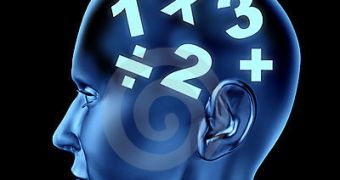A professor of psychology working with the University of Chicago has recently decided to investigate what happens inside an individual's head whenever the time comes for him/her to do math.
According to Sian Beilock, in the case of people who suffer from a so-called mathematics anxiety, the brain responds very much in the same manner as it does whenever it perceives the threat of bodily harm.
More precisely, mathematics anxiety activates the same areas of the brain which are responsible for pinning down threats to the individual's physical wellbeing, Eurek! Alert explains.
Interestingly enough, these brain areas sometimes also register physical pain, which is why this specialist concluded that the brain cannot really tell the difference between thinking about calculus and physically getting hurt.
Professor Sian Beilock developed his report on the effects math anxiety has on the human brain after he asked 14 adults to solve various mathematical problems and studied their brain activity while they were busy performing the tasks at hand.
“For someone who has math anxiety, the anticipation of doing math prompts a similar brain reaction as when they experience pain – say, burning one's hand on a hot stove,” he found while analyzing the brain activity of these volunteers.
Ian Lyons, PhD and postdoctoral scholar at Western University in Ontario, Canada, further explains these findings as follows:
“The brain activation does not happen during math performance, suggesting that it is not the math itself that hurts; rather the anticipation of math is painful.”
It is to be expected that these findings will impact on the methods used to teach mathematics in various educational facilities.
Thus, it is Sian Beilock's opinion that mathematics anxiety must be viewed as a type of phobia, and that the students suffering from it must be provided will all the support they might need in order to overcome it.
Apparently, expressing one's emotions concerning a math test prior to actually taking it helps ease this anxiety.

 14 DAY TRIAL //
14 DAY TRIAL //